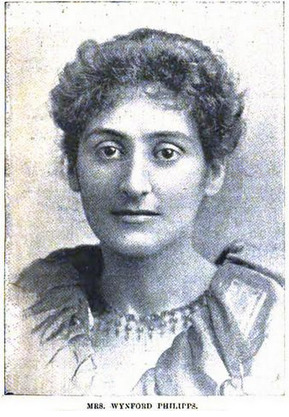Leonora Philipps facts for kids
Leonora Philipps (born November 4, 1862 – died March 30, 1915), also known as Nora Philipps, was an important British activist. She worked hard for women's rights and to help people in need.
Contents
Early Life and Education
Leonora was born in Camberwell, which was then part of Surrey. Her birth name was Leonora Gerstenberg. Her family was Jewish and her father was very rich. Sadly, she became an orphan when she was only fourteen years old. This meant she became a "ward of chancery," which is like being a child under the care of the court.
Leonora was a very bright student. She did well in school and then went to Birkbeck University College. She also studied at the Slade School of Art, where she learned how to work with metal. She even took drama lessons at the Royal Academy of Dramatic Art and had a private tutor for acting, Isabella Glyn.
Becoming a Champion for Change
As Leonora grew up, she was inspired by the ideas of John Stuart Mill, a famous thinker. She also saw poverty during her visits to the East End of London. Trips to the United States further opened her eyes. These experiences made her very interested in feminism, which is about equal rights for women, and in helping people who were poor.
She soon became active in the Women's Liberal Federation (WLF). This group worked to support liberal ideas and women's involvement in politics. Leonora quickly became the president of the Westminster Women's Liberal Association. Her family's money had grown over time, and by the late 1880s, she had about £100,000. This was a huge amount of money back then!
Marriage and Public Service
In 1888, Leonora Gerstenberg married John Wynford Philipps. He had just won an election to become a Member of Parliament for the Liberal Party. After her marriage, Leonora became a vice-president of the Scottish Women's Liberal Federation.
In 1891, she wrote a pamphlet called An Appeal to Women. A pamphlet is a small booklet. Her pamphlet was read by many people. In it, she encouraged women to get involved in public service and help their communities. She also gave talks on many different topics. These included temperance, which is about avoiding alcohol. She also spoke about helping shop assistants form unions and the importance of free education for everyone.
Leading the Way for Women
In 1891, the Women's Liberal Federation had a big disagreement about whether women should have the right to vote. Leonora strongly supported the idea that women should vote. In 1892, she was chosen as the president of the Welsh Union of Women's Liberal Associations.
She also helped start the Pioneer Club in London. This was a special club for women. She was also an early member of the Somerville Club. In 1897, she helped create the Women's Institute at Grosvenor Crescent. These groups were important places for women to meet, share ideas, and work for change.
Later Life and Legacy
In 1898, John Philipps became a Member of Parliament for Pembrokeshire. Leonora and John then moved to Roch Castle, a castle in that area. In 1908, John was given a special title and became a baron. This meant Leonora became Lady St Davids.
Leonora continued her public work. In 1909, she was one of the main organizers for a big national pageant held in Cardiff. A pageant is a large public show or procession. In 1913, she led a concert at the Abergavenny Eisteddfod, which is a famous Welsh festival of music and poetry.
Leonora Philipps was a dedicated activist who worked tirelessly for women's rights and social improvements throughout her life.
 | Frances Mary Albrier |
 | Whitney Young |
 | Muhammad Ali |


